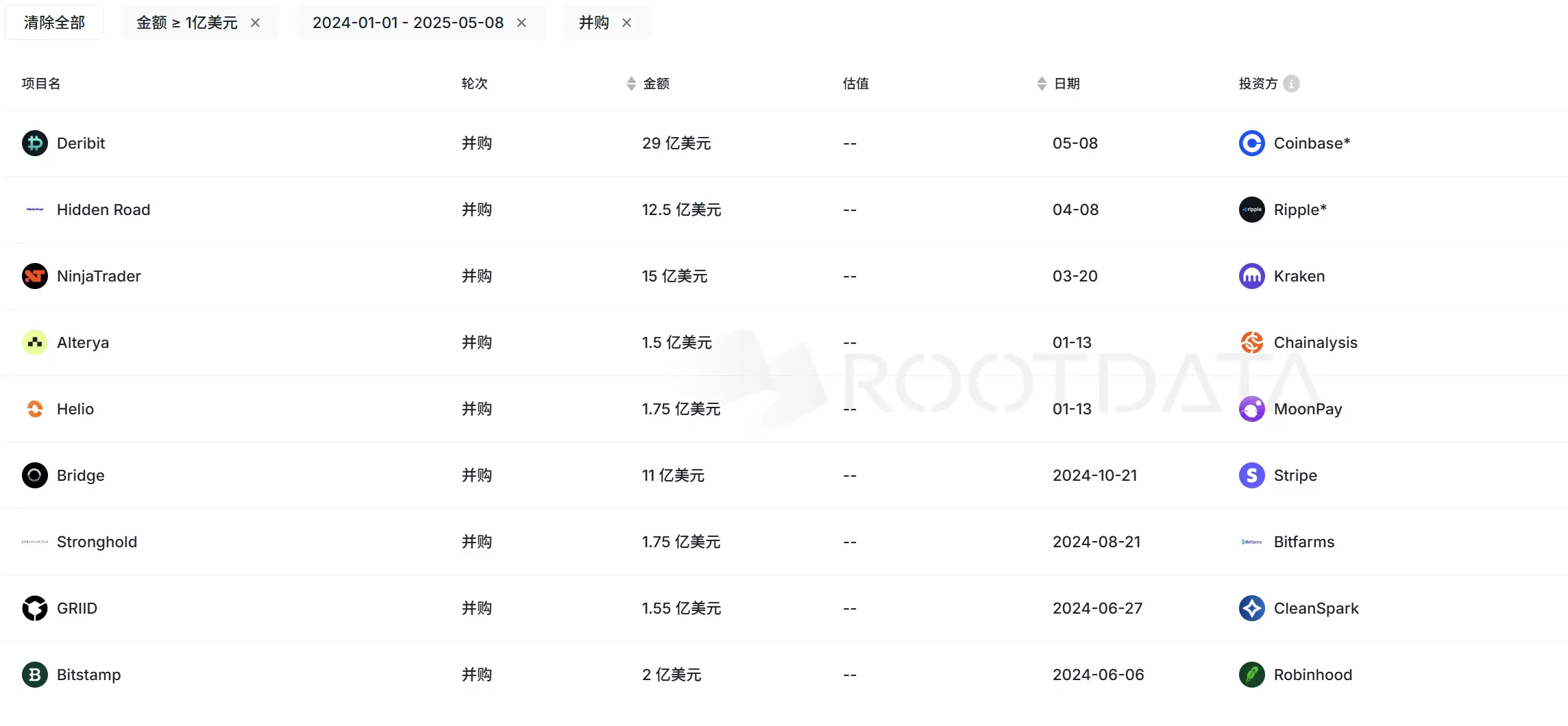$2.9 billion record merger: Coinbase swallows Deribit, the crypto derivatives market ushers in huge changes

Reprinted from panewslab
05/09/2025·14DAuthor: flowie, Fairy, ChainCatcher
Edited by: TB, ChainCatcher
Just now, Coinbase announced that it would acquire crypto options exchange Deribit for $2.9 billion, a deal that includes $700 million in cash and 11 million shares of Coinbase's Class A common stock. It set the Kraken record for $1.5 billion in acquisitions, becoming the largest acquisition in crypto history.
As the crypto options exchange with the largest market share, Deribit, under the bull market in 2024, the trading volume of Bitcoin options and the trading volume of Ethereum options accounted for as high as 80% and 90% respectively. Why did the torrent retreat at this time? After Coinbase acquires Deribit at a sky-high price, how will the market structure of crypto derivatives be reshaped?
The development legend of Deribit, the king of options
Deribit was incorporated in the Netherlands in 2016 and was co-founded by the brothers John Jansen and Marius Jansen.
The establishment of a crypto options exchange originated from the actual needs of his younger brother Marius. He was one of the earliest bitcoin investors and needed to hedge risks; but at that time, derivatives in the crypto market were still blank, so he found his brother John, who had a professional background in options, to plan a business. John has been involved in options trading since 1998. He worked as a trader on the Amsterdam Options Exchange and is currently the CEO of Deribit.
Deribit initially focused on Bitcoin options and futures trading, filling the gap in the cryptocurrency derivatives market at that time. In 2017, Deribit launched the Perpetual Contracts, becoming one of the first exchanges on the market to provide such products.
After 2018, the futures trading market began to grow, and Huobi and Binance also began to enter the futures market. Although facing competition, since 2019, Deribit, which entered the market early, has become the world's largest Bitcoin options exchange with its professional option experience and low fees, and continues to dominate this market. At the beginning of 2020, Deribit's Bitcoin options market share had accounted for as much as 86%.
Since then, Deribit has also raised more than US$140 million through three rounds of financing to complete faster expansion. QCPCapital, Three Arrows Capital, 10T Holdings, and Akuna Capital are all investors behind it.

Although Deribit's user portraits are mainly concentrated on high-demand professional investors and institutional users, they have always had a good reputation in the pursuit of growth and rarely have negative consequences.
In the bull market in 2024, Deribit once again experienced a sharp rise, with its annual trading volume exceeding US$1.1 trillion, a year-on-year increase of 95%. Among them, the option trading volume increased by 99%, and the spot trading volume achieved an astonishing growth of 810%. The platform's daily trading volume once exceeded US$1.9 billion, and the total open contracts reached a record high of US$48 billion on November 28, 2024.
Deribit has also continued to consolidate its dominance in the crypto options market. Its Bitcoin options trading volume once accounted for more than 80% of the total market trading volume, and Ethereum options trading volume accounted for as much as 90%.
Deribit's business is spread across 160 countries or regions around the world. After obtaining a license from Dubai Virtual Assets Regulatory Authority (VARA) in 2024, it has a new fertile ground for growth.
Why did Deribit choose to "retreat" at peak times?
During the growth process of Deribit, he has always faced two key issues: compliance challenges and growth bottlenecks.
In 2020, Deribit moved its operating base to Panama to avoid strict KYC requirements from the EU. In 2023, in order to cope with regulatory pressure, Deribit further moved to Dubai. In February this year, Deribit could only announce his withdrawal from the Russian market due to the sanctions imposed by the EU.
Deribit CEO Luuk Strijers has repeatedly stated that with the continuous strengthening of the global regulatory framework, many crypto trading platforms will exit the market due to excessive operating costs or direct shutdown by regulators, and Deribit itself faces similar challenges.
In addition to compliance problems, how to break through the ceiling may be a bigger problem for Deribit.
Deribit has extremely limited growth space in the crypto options market and is still facing severance. Other CEXs are also constantly expanding their derivative trading functions. CEXs such as BitMEX, OKX, Bybit continue to strengthen their derivative layout, and Kraken also acquired NinjaTrader for US$1.5 billion. These competitors have attracted a large number of users by providing high leverage trading, user-friendly interface and low trading fees. In addition, the rise of DEX also puts certain competitive pressure on it.
In addition to keeping the crypto options market, it is not easy for Deribit to expand horizontally to pursue growth. Nowadays, the entire crypto industry lacks new liquidity entry, and major sectors such as Binance and OKX are facing intra-conversion and growth difficulties. Under regulatory pressure and involuntary, this may mean that Deribit will have to spend more on operating costs to gain an uncertain growth.
Against this background, choosing to leverage mergers may be a step for Deribit to move from maintaining success to breaking through.
Although Deribit has leading technology and market share in the field of crypto options, its product line is still relatively single. If merged with Coinbase, the two parties can complement each other at the spot, futures and options levels and build a more complete derivatives ecosystem.
For Coinbase, Deribit can bring about $30 billion in open contracts and trading volume of more than $1 trillion, which will significantly enhance its derivative competitiveness; for Deribit, leveraging Coinbase's global user base and compliance advantages, especially its in-depth layout in the US market, will help its internationalization.
This merger and acquisition also occurred at a critical juncture of policy shift: Trump returned to the White House and promoted crypto-friendly policies, and the market demand for compliant platforms has increased significantly. Against this background, Deribit's choice to retreat at this time may be a wise choice to take advantage of the situation to break through and move towards the next growth curve.

How does Coinbase reshape the crypto derivatives landscape?
Coinbase has completed at least 21 acquisitions since 2014, and this acquisition of Deribit is the largest in its history. This not only marks a strategic upgrade of Coinbase, but also once again highlights the trend of the crypto derivatives market being accelerated by mergers and acquisitions.
In addition to Deribit, many derivative platforms are also "selling themselves". On February 28, according to CoinDesk, BitMEX, a veteran crypto derivatives platform founded by Arthur Hayes, is also seeking to sell. In addition, Arbelos Markets, a startup for crypto derivatives, was also sold to crypto brokerage firm FalconX.
The rapidly growing and mature crypto derivatives market has become a must-fight for top players. In 2024, the average daily trading volume of the global crypto derivatives market has exceeded US$100 billion, and the monthly trading volume has exceeded US$3 trillion.
Coinbase has also been working hard to expand its derivatives business in 2024, with more than 90 new assets added to international exchanges to drive growth in its derivatives trading volume. According to a CCData report, Coinbase's derivatives market share grew by 3.89% in 2024.
But compared to building oneself, mergers and acquisitions are not a fast and effective way. By acquiring Deribit, Coinbase can not only quickly enhance the scale and competitiveness of its derivatives business, but also compete with global derivatives giants such as Binance and Bybit.
The acquisition may have a profound impact on the landscape of the crypto derivatives market. As market concentration increases, other cryptocurrency exchanges may face strategic adjustments, and even a round of industry integration occurs. At the same time, smaller exchanges will face greater competitive pressure and may even be marginalized.
Traditional financial institutions have long entered the crypto market through ETFs and derivatives, and the strong alliance between Coinbase and Deribit will undoubtedly attract more institutional investors and further promote the integration and intersection of traditional finance and crypto markets.
However, it remains to be seen whether Coinbase can continue Deribit's specialized and refined product style and high standards and serve this market well.
The crypto industry ushers in a wave of mergers and acquisitions
According to RootData data, since 2025, there have been 48 mergers and acquisitions in the encryption field, with an average of nearly 10 crypto acquisitions in one month.
The total merger and acquisition incidents in 2024 reached 105, a record high, an increase of 36.3% from 77 in 2023.
In terms of the amount of mergers and acquisitions, since 2024, 9 mergers and acquisitions have exceeded US$100 million, and the amount of mergers and acquisitions has been breaking through new highs. Not long before Deribit was acquired by US$5 billion, in March 2025, Kraken acquired US futures trading platform NinjaTrader for US$1.5 billion.

From 2024 to the present, more than US$100 million merger case
With the maturity of the cryptocurrency market, the trend of industry integration is obvious, and only a few platforms can finally stand out.
In the incentivized market competition, giants quickly expand their products and services through acquisitions. For the acquired project parties, in the case of inverted valuations in the first and second level, compared with issuing coins, mergers and acquisitions are not a perfect way to exit.


 jinse
jinse